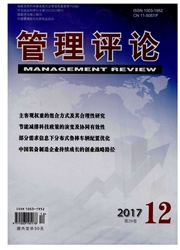

 中文摘要:
中文摘要:
近年来,IT战略联盟广受商务经理和IT经理的重视。由于先前研究中忽视中介因素和企业财务绩效指标的细分,IT战略联盟是否以及如何影响企业绩效,理论界的结论并未统一。研究基于IT战略联盟,企业资源观,社会技术系统理论,以及能力溢出效应,并结合电子商务企业实践,构建了EB战略联盟,电子合作能力,企业绩效的关系模型。基于80家制造企业的调查数据和财务数据,本文使用PLS结构方程对研究模型进行了验证。研究发现(1)EB战略联盟对企业绩效没有直接作用,而通过电子合作能力间接影响企业绩效;(2)电子合作能力(电子采购能力和电子销售能力)是EB战略联盟和企业绩效(ROA和IN/A)的中介变量;(3)电子采购能力对电子销售能力具有溢出效应。该结论丰富了IT战略联盟的研究,并为研究者和管理者探索EB战略联盟的价值机理提供了理论基础。
 英文摘要:
英文摘要:
Over recent years, IT strategic alliance has been widely paid attention by business executives and IT managers. Since the existing studies ignore the intermediary factors and the subdivision of financial indexes, this results in inconsistent conclusions of whether and how IT strategic alliance affects firm performance. Based on IT strategic alliance, resource-based view, socio-technical systems theory, spillover effects and e-commerce business practices, this paper builds a model of the relationship among EB strategic alliance, e-collaboration, and firm performance. We adopt PLS 2.0 to analyze 80 firms' survey data and financial data and validate the model. Our findings show that ( 1 ) EB strategic alliance has no direct effect on business performance, and indirectly affects firm performance through e-collaboration;(2) e-collaboration capabilities (including e-procurement and e-selling capabilities) is the mediator between EB strategic alliance and firm performance (e.g. ROA and IN/A) ; (3) e-procurement capability has a spillover effect on e-selling capability. This paper extends prior studies on IT alliance, and provides theoretic basis for researchers and managers to explore the value creation process of EB strategic alliance.
 同期刊论文项目
同期刊论文项目
 同项目期刊论文
同项目期刊论文
 期刊信息
期刊信息
